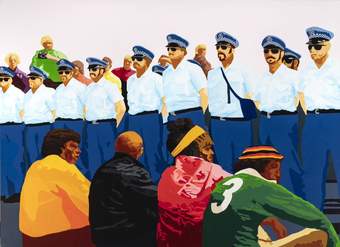Richard Bell lives and works in Brisbane. He is a descendent of the Kamilaroi, Kooma, Jiman and Goreng Goreng peoples. He was an activist and community worker for the New South Wales Aboriginal Legal Service in the 1980s before becoming a full-time artist and co-founding the Aboriginal art collectives Campfire Group in 1990 and proppaNow in 2004. He works across painting, installation, performance, and video. Bell is one of Australia’s most significance artists and his work explores the complex artistic and political problems of Western, colonial and Indigenous art production. He grew out of a generation of Aboriginal activists and has remained committed to the politics of Aboriginal emancipation and self-determination.
Black Cultural Archives (BCA) is an archive and heritage centre in Brixton, London, devoted to the histories of people of African and Caribbean descent in Britain. Also known as BCA, it was founded in 1981, by educationalist and historian Len Garrison and others. BCA's mission is to record, preserve and celebrate the history of people of African descent in Britain. The BCA's new building in Brixton, opened in 2014, enables access to the archive collection, provides dedicated learning spaces and mounts a programme of exhibitions and events.
Farrukh Dhondy is an Indian-born British writer, playwright, screen writer and activist who resides in the United Kingdom. In the 1970s Dhondy became involved with the Bengali Housing Action Group (BHAG), Indian Workers' Association, the British Black Panthers and Race Today Collective. Dhondy's literary output is extensive, including books for children, textbooks, biographies and scripts for theatre. He is also well known for his film and TV work, having been Commissioning Editor, Multicultural Programming, for Channel 4 from 1984 to 1997.
Emory Douglas worked as the revolutionary artist and minister of culture for the Black Panther Party in the San Francisco Bay Area from 1967 through the early 1980s. In addition to creating iconic posters and postcards, a crucial part of Douglas’ responsibilities included art direction, design, and illustration for the organisation’s newspaper, The Black Panther. Douglas’ work has been the subject of numerous international exhibitions, and in 2015, Douglas re ceived the American Institute of Graphic Art lifetime achievement medal. (*Bio used by MCA)
Leila Hassan Howe is a British editor and activist, who was a founding member of the Race Today Collective. She worked for the Institute of Race Relations and became editor of the Race Today journal in 1986. Hassan was also a member of the Black Unity and Freedom Party. She is co-editor of a collection of writings from Race Today published in 2019 and editor of a special issue of Race Today published this year – which features debate and views on current political and cultural issues - national and international.
Hannah Ishmael is the Collections and Research Manager at the Black Cultural Archives, based in London. She completed a PhD at UCL on the development of Black-led archives in London.
Jacob V Joyce is an artist, researcher and educator from South London. Their work is community focussed ranging from mural painting, illustration, workshops, poetry and punk music with their band Screaming Toenail. Joyce has illustrated international human rights campaigns for Amnesty International and Global justice Now, had their comics published in national newspapers and self published a number of DIY zines. Their work with OPAL (Out Proud African LGBTI) has gone viral across the African Continent and increased the visibility of activists fighting the legacies of colonially instated homophobic legislation.
Sofia Karim’s practice combines architecture, visual art, and activism. Her activism focuses on human rights across Bangladesh and India. She campaigns for the release of imprisoned artists and political prisoners. She is the founder of Turbine Bagh, a joint artists’ movement against fascism and authoritarianism and platform for political art and activism.
Papi’s Pickles is a social enterprise cooking fresh South Indian and Sri Lanka food, made by women from these communities who relocated to the UK due to the conflict in Sri Lanka.

